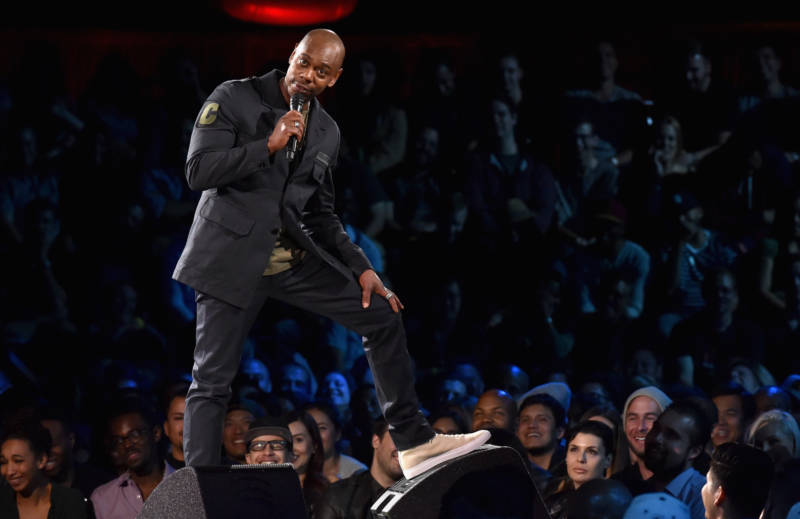Edgy, politically incorrect and occasionally scatological, Chappelle’s career skyrocketed with three seasons of Chappelle’s Show (2003-2006), one of the most popular comedy shows on TV. Co-created with Neal Brennan, the sketches on Comedy Central spared no one.
Chappelle’s impersonations of Prince, Rick James and Lil Jon are now legendary. In a sketch that stretched the imagination and boundaries of racial satire, Chappelle played Clayton Bigsby, a blind white supremacist who doesn’t know he’s black.
It was “revolutionary,” must-see TV, wrote Rembert Browne, who was a teenager when Chappelle’s Show aired: “It was unacceptable to show up to high school the next day without knowing all the material from the previous night’s episode.”
Chappelle’s Show earned three Emmy nominations and became a bestseller on DVD. But after signing a reported $50 million deal for Seasons 3 and 4, Chappelle famously and abruptly disappeared from entertainment altogether. He spent two weeks in South Africa and then moved to Yellow Springs, Ohio, with his family.
“I felt in a lot of instances I was deliberately being put through stress because when you’re a guy who generates money, people have a vested interest in controlling you,” he told Oprah Winfrey.
Chappelle eventually returned to stand-up. He signed a multimillion-dollar deal with Netflix. Last year, two of his Netflix comedy specials — Equanimity and The Bird Revelation — won a Grammy Award (packaged together) for best comedy album. Equanimity also won an Emmy for outstanding variety special.
His latest specials address hot-button issues such as race, class, gender, President Trump and the #MeToo movement. Chappelle compared the current women’s movement to African Americans’ long struggle for equal rights, and even suggests South Africa’s Truth and Reconciliation Commission as a model for inspiration.
Not all of the jokes in his recent specials have landed well with all audiences. Critics have repeatedly objected to his jokes about people who are transgender and the #MeToo movement.
Setting aside his fondness for dirty and transgressive material, Chappelle is socially conscious to his core. His father was a professor at Antioch College. His mother taught at Howard University. For high school, Chappelle attended the Duke Ellington School of the Arts in Washington.
“Dave is a hometown hero here in Washington, D.C., where he grew up,” Rutter also said. “We’re so looking forward to welcoming him back home [at the Kennedy Center].”
His appearance on Saturday Night Live, days after Donald Trump won the 2016 presidential election, also received an Emmy. His opening monologue took jabs at the president-elect, and skewered black and white stereotypes, before turning more serious at the end, as he reflected on a BET party he’d attended at the White House during the Obama administration.
“So, in that spirit, I’m wishing Donald Trump luck,” Chappelle said. “And I’m going to give him a chance, and we, the historically disenfranchised, demand that he give us one too.” He has, however, since apologized for that remark.
null
Copyright 2019
NPR.
9(MDAxOTAwOTE4MDEyMTkxMDAzNjczZDljZA004))

9(MDAxOTAwOTE4MDEyMTkxMDAzNjczZDljZA004))

